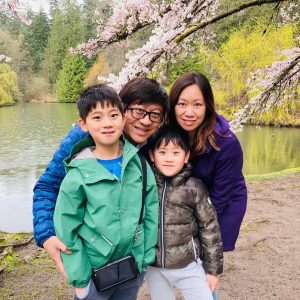For parents Joseph Kwan and Joyce Lo, their journey into UBC’s Master of Educational Technology (MET) program together started with the goal to support their son and to empower special-need families.
Their 10-year-old son, Jayden, is minimally verbal and uses an Augmentative and Alternative Communication (AAC) device to communicate his thoughts, feelings, and emotions.
Kwan and Lo quickly realized that educational technology was going to play an important role in their son’s life and viewed the MET program as playing an important role in achieving their goals. “We have a purpose in this program,” Kwan explained. “We know what we want: to learn and apply strategies within our home, school, and community environments every day.”

Joseph and Joyce and their sons Jayden (left) and Jeffrey.
As a manager and elementary school teacher, Kwan and Lo thought that they had the experience to advocate for their son and access services, but were surprised by the challenges and gaps in educational opportunities.
“Many classroom teachers don’t have specific training needed to support students with complex communication needs,” Kwan said. Over the years, Kwan and Lo have encountered people who incorrectly assume that “children cannot read or write just because they cannot hold a pencil, or they cannot learn because they cannot verbally communicate.”
Kwan and Lo believe it is essential that children with special-needs are supported with the belief that “everyone can learn.”
“Every child is unique but let’s not deprive them the opportunity to learn,” Kwan emphasized.
The MET program has given them “more tools for their toolbox” as well as the ability to support other parents and educators.
“We want to provide hope, encouragement, and strategies for others going through similar journeys,” Kwan said. “We have lived through and experienced the hardships and inequities that exist due to systemic ableism in society,” Lo shared. “It has become a passion of ours to advocate for true inclusion, bring awareness to ableism and disability, and advance learning for people of all abilities through the use of technology.”
Through ETEC 580 and with support of their advisors, Dr. Jennifer Jenson and Dr. Suzanne de Castell, Kwan and Lo are holding a PANDA (Promoting and Advancing) AAC Camp this summer.
The Camp is for children with disabilities whose primary mode of communication is AAC. “Our goal is to improve AAC education, communication, and literacy,” Lo says.
The PANDA AAC Camp is organized by the BC Association for Advancing Communications (BCAAC), a non-profit organization that Kwan and Lo co-founded. The Camp is also sponsored by the Edith Lando Virtual Learning Centre, Burnaby Association for Community Inclusion, BC Centre for Ability, and Speech Meta.
Kwan and Lo had participated in a similar AAC camp in the U.S. and found the experience “transformative,” but were unable to find anything similar in B.C.
In 2021, Kwan and Lo supported Camp CONNECT, run through UBC Faculty of Medicine’s School of Audiology and Speech Sciences (SASS). Camp CONNECT had a positive impact on Jayden and the other campers. “We wanted to be more involved and create a similar experience again this summer for other children and families using AAC devices,” Kwan said.
“There may be stigma out there, but there’s also support,” Kwan expressed. “So many people have helped us along our journey and we want to pay it forward.”
The PANDA AAC Camp is running on the UBC Vancouver Campus from August 3-6. Learn more about the 2022 PANDA AAC Camp.